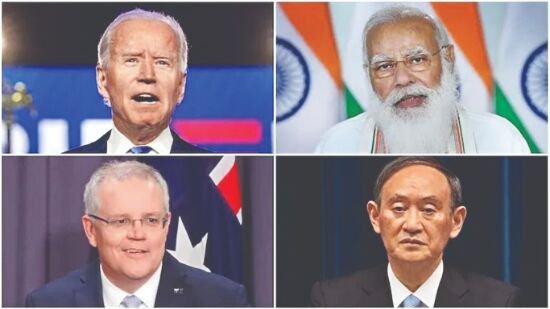In new form
The paradigm shift from being an informal arrangement to a coordinated supplier of vaccines makes Quad more significant in the pandemic-hit world

The Quadrilateral Security Dialogue (Quad) entered a definitive phase, gripping attention of the world on March 12 when United States President Joe Biden interacted with Prime Ministers of — Australia, Scott Morrison; Japan, Yoshihide Suga; and India, Narendra Modi.
From being an informal arrangement that began in 2007 on the back of coordinated disaster relief in Indo-Pacific region to provide succour to people affected by the unprecedented havoc caused by the tsunami in 2004, Quad has travelled a long distance.
Having indicated commitment to the Indo-Pacific policy with Quad as its foundation, the new Biden administration pushed for the first-ever summit meeting in a virtual format and announced an in-person meeting towards the end of 2021.
Coming as it did at a time when the world is exploring to hasten recovery from the southward dive of economies on account of the global health pandemic, the summit declaration outlined issues to be attended on priority basis — "the global devastation wrought by COVID-19, the threat of climate change, and security challenges facing the region".
The first summit was also an opportunity to demonstrate areas of convergence, with Prime Minister Modi underscoring that all four countries "are united by their democratic values, and commitment to a free, open, an inclusive Indo-Pacific" The areas of convergence include vaccines, climate change and emerging technologies to make Quad a force for global good.
"Since the 2004 tsunami, the world has come to face other challenges such as climate change which has grown more perilous, new technologies which have 'revolutionized our daily lives', geopolitics which has become ever more complex, and a pandemic that has devastated the world", the leaders wrote in a joint Op-Ed in the Washington Post after the meet.
In a unique signature move, they wrote "Against this backdrop, we are recommitting to a shared vision of an Indo-Pacific region that is free, open, resilient and inclusive."
The Quad move comes in the backdrop of an assertiveness and expansionist intention of Beijing in the Indo-Pacific region. While India is facing the Chinese military in the icy heights of Ladakh , Japan is battling a dispute in Senkaku island and Australia is slapped with trade sanctions. Though there was no categorical reference to China, the intent of the meeting left no room for doubt.
Reacting to the meeting, China said cooperation between nations should not "target or damage the interests of a third party" and "countries should uphold principles of openness, inclusiveness and win-win results, refraining from pursuing exclusive blocs and doing things that are conducive to regional peace and stability".
For a country that first issued demarches in 2007 against holding of Malabar joint naval exercise, to dismissing Quad as a 'sea foam' that would dissipate and then characterising it as Asian NATO, China has come to realise the significance of the grouping.
One of the key areas that the Quad decided to take forward to demonstrate collective efforts is that India will produce the vaccine for COVID-19 with funding from Japan and the United States and Australia providing the logistics to make it reach across countries in ASEAN and Indo-Pacific.
The outreach in a way counters China in the supply of vaccines across the region to countries that await doses. As outlined in an earlier column by the writer on February 24, Quad's immediate priority should focus on economic aspects. India's role as a reliable partner during the early phase of the pandemic, and now with supply of vaccines, establishes New Delhi's primacy as the leading vaccine supplier in the world.
The decision to utilise India's capacity and grant loans to build additional capacity should allow New Delhi fine-tune its strategy to build the country's position as a dependable member of the global supply chain. With multinational companies seeking to relocate from China after trade war with the United States and accentuated by disruption caused by the pandemic, the development augurs well for the country.
Another issue of concern for all members of Quad is the emergence of critical technology with China pitching itself as a major force in 5G, AI and other disruptive technologies. In this regard, questions have been raised in the United States on the trustworthiness of equipment supplied by Chinese firms.
In this realm, the decision to set up a Critical and Emerging Technology Working Group will help Quad members to coordinate on standards of development, telecommunication deployment and diversification of equipment suppliers.
Once again this demonstrates a conscious effort to make Quad countries rely less on China, especially in procuring rare earth essentials that are vital in batteries and high performance motors.
The Quad meeting and its effect can be further gauged when China and the United States Foreign Ministers Wang Yi and Anthony Blinken and National Security Advisors Jake Sullivan and Yang Jeichi meet on March 18 at Alaska ahead of President Biden and President Xi Jingping's meet later this month. These meetings should offer some insights for policy planners around the globe.
Views expressed are personal



